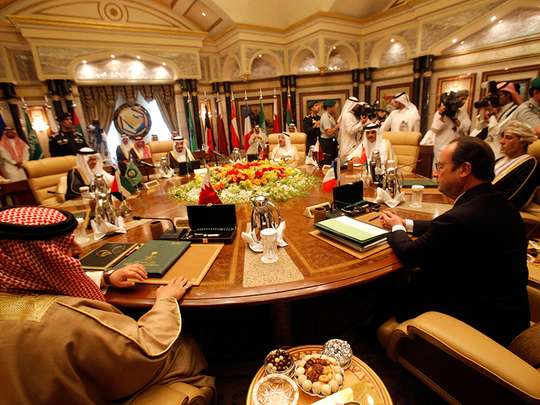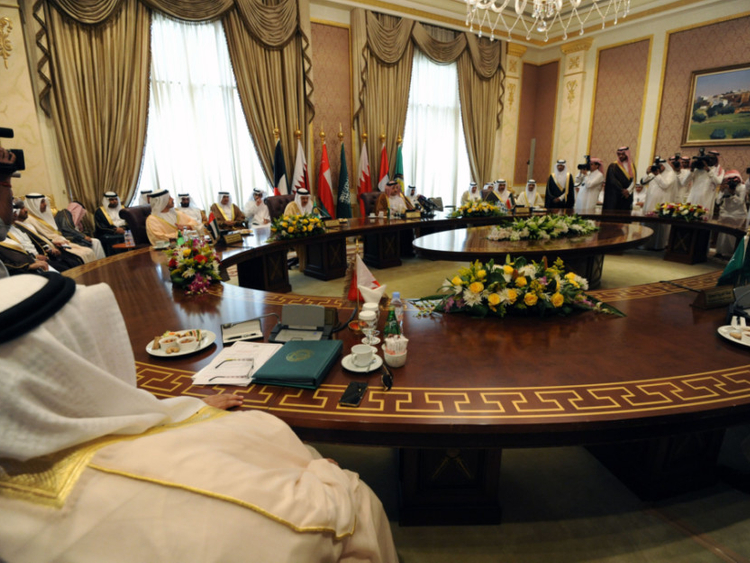
Manama: The Gulf Cooperation Council (GCC) advisory summit on Tuesday will be recalled in history as the summit of firsts.
It is the first summit for Saudi King Salman Bin Abdul Aziz who took the throne on January 23 following the death of King Abdullah.
It is also the first summit for Crown Prince Mohammad Bin Nayef and for Deputy Crown Prince Mohammad Bin Salman who were appointed on April 29 to the positions.
It is also the first GCC summit to be attended by the leader of a Western country, François Hollande, the president of France, since the alliance comprising Bahrain, Kuwait, Oman, Qatar, Saudi Arabia and the UAE was established in 1981.
Yemen assistance
Saudi King Salman announced on Tuesday the establishment of a centre to coordinate humanitarian assistance for Yemen, and invited the United Nations to join in relief work for the Arab country.
"We hope that the United Nations will participate effectively with what this centre will shoulder, including coordinating all humanitarian and relief works for the Yemeni people with the participation of the countries that are supporting the Gulf initiative," he said in a speech at the start of a summit of Arab heads of state in Riyadh carried live by the Saudi-owned Al Arabiya channel.
GCC summit's relevance
“The GCC obviously wanted to send a very potent message to all those who blinked or doubted its capabilities,” Mohammad Jaber, a Bahraini consultant, said. “There is a new reality on the ground and everyone should learn to deal with the new facts,” he added.
The GCC has been holding two summits annually since 1999. The formal summit is held in December on a rotating basis and has a formal agenda. It lasts one or two days depending on the discussions of the issues on the agenda.
The second summit, held in May in Saudi Arabia, is equally important, but it has no formal agenda and discussions are open among the leaders. It usually lasts one day.
Although the summit on Tuesday does not have a specific agenda, the latest developments in neighbouring Yemen where five of the six GCC members are engaged in military and humanitarian operations and the summit with US president Barack Obama at Camp David on May 14 will certainly figure high on the talks.
“This is going to be a smooth summit in Riyadh because the GCC members have very convergent ideas about their shared interests,” Mohammad said. “They have the same views about the situation in Yemen even though Oman did not fully share them. They all agreed on the significance of countering the Al Houthi followers and halting the spread of the Iranian influence in Yemen, especially after the growth of Iran-supported groups in Lebanon, Iraq and Syria.”
The need for the US to understand the concerns of the GCC countries about an agreement with Iran over its nuclear programme at their expense is also a matter of consensus, he added.
“There is again a team approach on this issue as well, so the GCC countries will not have to negotiate among themselves to adopt a common stance towards the hegemonic ambitions of Iran. The position is already there. The fact that the differences with Qatar have been overcome months ago has led to a greater Gulf alignment. In a way, the GCC countries do not need to exercise or warm up ahead of their summit with Obama. They are fully ready as a team.”
While more apples of discord are marking the GCC relations with the US, the alliance’s traditional ally, due mainly to approaches to Iran’s nuclear programme, France has been moving steadily towards filling in any possible vacuum and giving much-needed assurances about its role.
Foreign Minister Laurent Fabius on April 12 made his third visit to the Saudi capital since he was given the diplomacy portfolio almost three years ago.
In an impressive indication by the Saudis towards France, King Salman received the French minister.
According to French senior editors, Fabius had several reassuring messages for the Saudis. He stressed that France supported the military intervention in Yemen, saying that Paris did not accept “the removal of the legitimate authority,” referring to the Al Houthi takeover.
“France’s leaders see the Saudi-led military operations in Yemen as legitimate and as a strong signal to Iran in order to bring everybody to the table of negotiations,” the French said.
President Hollande openly sided with the Saudis and the GCC states on the major issues in the region.
He was particularly enthusiastic about a military intervention in Syria, supported the military intervention in Yemen and opposed a deal with Iran that did not give enough guarantees to the GCC states.
“Nobody saw it coming. Nobody could predict that the socialist president of France would side with the GCC,” Christophe Ayad, the editor of international affairs at French daily Le Monde, wrote.
“In an increasingly complex Middle East marked by politico-religious fault lines, François Hollande is one of the few leaders to take a stance and without hesitation. He has chosen the camp of the moderate Sunni Arab regimes, led by Saudi Arabia.”
Mustapha Tossa, another French journalist, attributes the “honeymoon” between the GCC and Hollande to “a logical conclusion of conditions and policies.”
“In his frantic desire to conclude an agreement with the Iranians before the end of his term, Obama superbly ignored the concerns of his Sunni allies in the region that Iran would take advantage of the accord to consolidate its power and domination,” he said.
“Since his arrival at the Elysee and unlike his predecessor Nicolas Sarkozy who considered Qatar as the political engine of the region, François Hollande has rebalanced the game in favour of Saudi Arabia, restoring the lustre of its regional leadership. This approach has been accompanied by three major positions that eventually got him the unwavering support of the Saudis. His intractable position against [Syrian president] Bashar Al Assad, his strong demands to slow the compromise on Iran’s nuclear programme and his political and logistical support for the war against the Houthis in Yemen,” he wrote.













